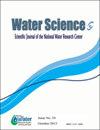Improving mango production using partial root drying technique and organic fertilisation: Field and modeling study
Q2 Environmental Science
引用次数: 0
Abstract
The decreasing in water availability due to climate change can affect agricultural production. The water shortage problem led to the development of several water saving techniques. One of the waters saving techniques in irrigation is the partial root-zone drying (PRD) method. Tow field experiments accompanied by a modeling study were carried out during seasons 2020/2021 and 2021/2022, respectively, using four deficit irrigation strategies [FI (100% of full irrigation), DI1 (0.75FI), DI2 (0.5FI) where water was supplied to both sides of the mango trees and DI3 (Partial Root-zone Drying, PRD = 0.5FI) where water was supplied to a single side of each tree in an alternating manner)]. The four irrigation methods were designated as the study’s major plots. Then, for the purpose of adding compost, each main plot was divided into four smaller plots [NC (No-Compost), C12 (12 ton ha−1), C18 (18 ton ha−1) and C24 (24 ton ha−1)] to investigate the effects of such treatments on increasing water productivity, yield, and the quality of mango fruits. The results indicated that adding compost with PRD irrigation method decreased water stress throughout the root zone and increased the yield, water productivity and fruit quality. Compost addition C24 (24 ton ha−1) with PRD irrigation increased the amount of soil organic matter and microorganism activity when compared to other treatments. Additionally, C24 treatment improved mango quality under both FI and PRD treatments, the PRD technique enhanced fruit yields by 3.8% and 7.3% and water productivity by 51.6% and 53.8% for 2021 and 2022 seasons, respectively, compared to FI, while reducing the applied irrigation water by 50% for each season. In comparison to other irrigation strategies, the PRD strategy had shown superior outcomes in enhancing the yield, water productivity, and quality of mango yield. With the use of compost “C24” as organic matter fertilizer, PRD proved to be an effective dual technique to save water and increase productivity. Under both current and future water scarcity caused by climate change, it could be a successful adaptation technique. The SALTMED model produced accurate simulations of the soil moisture content, mango production, and water productivity during the two seasons.利用部分根系干燥技术和有机施肥改善芒果产量:田间和模型研究
气候变化导致的可用水量减少会影响农业生产。水资源短缺问题导致了几种节水技术的发展。灌溉节水技术之一是部分根区干燥法(PRD)。在2020/2021和2021/2022季节分别进行了两项田间试验和建模研究,采用四种亏缺灌溉策略[FI(100%完全灌溉),DI1 (0.75FI), DI2 (0.5FI),向芒果树的两侧供水,DI3(部分根区干燥,PRD = 0.5FI),以交替的方式向每棵树的单侧供水]。这四种灌溉方式被指定为研究的主要地块。然后,以添加堆肥为目的,将每个主地块分为4个小地块[NC(不堆肥),C12 (12 t ha−1),C18 (18 t ha−1)和C24 (24 t ha−1)],研究这些处理对提高芒果水分生产力,产量和品质的影响。结果表明,PRD灌溉方式下添加堆肥可降低全根区水分胁迫,提高产量、水分生产力和果实品质。与其他处理相比,PRD灌溉下堆肥添加量C24 (24 t ha−1)增加了土壤有机质和微生物活性。此外,在FI和PRD处理下,C24处理提高了芒果品质,与FI相比,PRD技术在2021年和2022年的果实产量分别提高了3.8%和7.3%,水分生产力分别提高了51.6%和53.8%,而每个季节的灌溉水量减少了50%。与其他灌溉策略相比,珠江三角洲灌溉策略在提高芒果产量、水分生产力和产量质量方面表现出更优的效果。珠江三角洲采用堆肥“C24”作为有机肥料,是一种有效的节水和提高生产力的双重技术。在气候变化引起的当前和未来水资源短缺的情况下,它可能是一种成功的适应技术。SALTMED模型对两个季节的土壤水分含量、芒果产量和水分生产力进行了精确的模拟。
本文章由计算机程序翻译,如有差异,请以英文原文为准。
求助全文
约1分钟内获得全文
求助全文

 求助内容:
求助内容: 应助结果提醒方式:
应助结果提醒方式:


